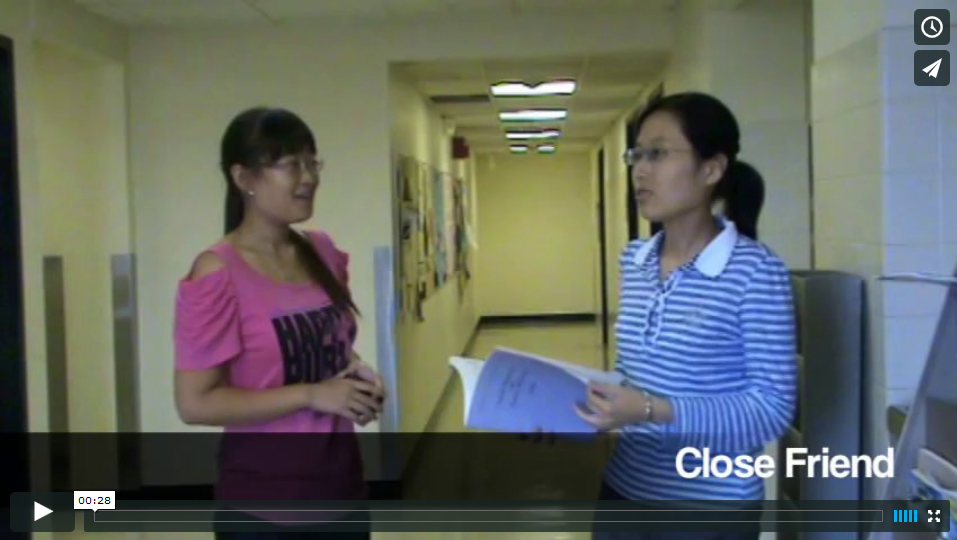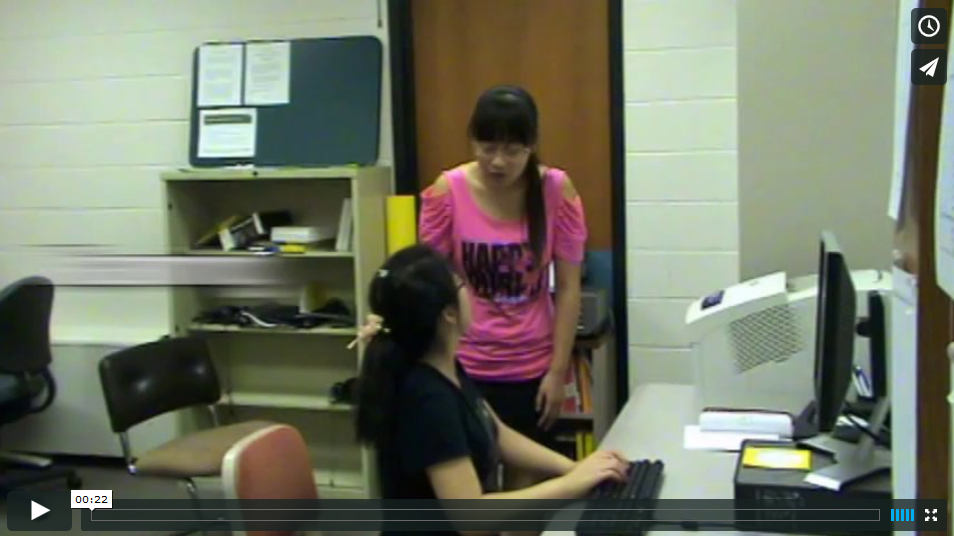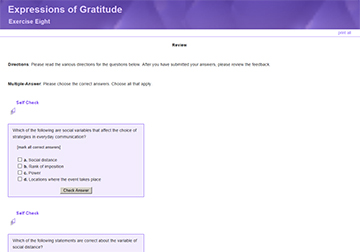Unit 8: Variable of Social Distance
Unit 8 explicitly teaches students pragmatic rules regarding how to choose and vary thanking strategies according to the variable of social distance in Chinese.
8.1 Goal of Unit 8
The goal of Unit 8 is to familiarize students with the impact of the variable of social distance on expressions of gratitude in Chinese, and to train them how to choose and vary thanking strategies according to this variable.
8.2 Social Distance
According to Brown and Levinson's (1987) politeness theory, there are three social variables based on which speakers should vary their strategies: social distance, power (i.e., the relative power between interlocutors, e.g., boss and the subordinate), and rank of imposition (take gratitude as an example, it refers to the relative extent of obligations based on which gratitude should be expressed). Previous studies have reported that these variables have differential effects on the choice of thanking strategies in Chinese (e.g. Li, 2004; Yang, 2009). This section introduces the variable of social distance, which has a great impact on expressions of gratitude in Chinese.
Social distance can be understood as differing degrees of familiarity between interlocutors (Brown & Levinson, 1987). In other words, it refers to the differential relationships between interlocutors such as close and distant relationships. It can be considered a continuum with two ends, one of which is the closest such as parents and relatives, while the other is just the opposite such as strangers. See the figure below:
Thinking: If social distance is a continuum, what other relationships can be put along this line in addition to the two ends?
8.3 How to Vary Thanking Strategies according to Social Distance
According to politeness in Chinese and research findings from previous studies (Bi, 1996a, 1996b; Li, 2004; Yang, 2009), with other factors the same, generally speaking, the closer it is between the interlocutors in their relationships, the more indirectly speakers will possibly express gratitude.
As introduced in Unit 7, there are four notions underlying politeness in Chinese, including respectfulness, modesty, attitudinal warmth, and refinement. Based on this, what counts as a polite behavior is to think from others' perspectives but to require self-denigration and self-refinement.
As friends and family members are close in the relationship with the self, the self needs to require self-denigration and self-refinement toward them. In the case of expressing gratitude, therefore, native speakers of Chinese usually do not explicitly express their gratitude to people close to them in relationship. Sometimes, they will even not say anything to their parents or close friends after getting small favors. Not saying anything in this situation is considered polite and appropriate in Chinese. If native speakers of Chinese explicitly express gratitude to their parents or close friends under this circumstance, it would make their parents or close friends feel awkward, and thus sociopragmatic failure occurs.
On the contrary, when expressing gratitude to a person with a distant relationship, speakers should show admiration toward others and thus are required to acknowledge his or her indebtedness explicitly. That is, speakers should express their appreciation directly.
Two things should be noted here. First, this traditional practice of expressing gratitude has undergone changes in recent years. Some people have begun to verbalize their gratitude directly to close friends or family members (Yang, 2009). Nonetheless, restrained by the Chinese conception of politeness (Gu, 1990), the traditional way of expressing gratitude is still widely acknowledged and practiced. Second, in addition to social distance, other social variables such as power and rank of imposition also affect how gratitude in expressed in Chinese. That is, speakers should also vary their strategies based on these variables in order to appropriately express gratitude. This section focused only on the impact of social distance on expressions of gratitude. In addition, gratitude realization is subject to individual variations. Individuals may express gratitude in idiosyncratic ways. Therefore, to learn how to appropriately express gratitude in Chinese, it is suggested that students should pay close attention to how Chinese speakers express gratitude in everyday communication and consciously use what they have learned to help analyze the thanking expressions they hear in daily life.
Thinking: Have you encountered any situations in which Chinese speakers choose not to say anything to their friends/parents after getting help? If yes, what are the situations? What do you think of this phenomenon now?
8.4 Examples and Analyses
This section provides you with two videos involving two similar scenarios, in one of which Xiaoming (a girl) expresses gratitude to her close friend, while in the other Xiaoming expresses gratitude to a stranger. Pay attention to the differences between the thanking strategies Xiaoming uses in Scenario 1 and Scenario 2.
Scenario 1: Cell Phone Scenario with a Close Friend
Scenario 1: Xiaoming’s cell goes dead when she answers an important call. She asks her close friend if she could use her cell phone for a second. Pay attention to how Xiaoming thanks her friend when she returns the cell.
Please access the video by clicking the image above or clicking the link here.
Xiaoming's Response: 还好你带手机 (cell phone) 了。明天我请你吃饭吧。
Háihǎo nǐ dài shǒujī le. Míngtiān wǒ qǐng nǐ chī fàn ba.
In this scenario, Xiaoming borrows the cell phone from her close friend. When she expresses her gratitude, she chooses to use the combination of promising to reciprocate and supposing instead of direct thanking strategies. This is an appropriate thanking expression according to politeness in Chinese.
Transcript:
Xiaoming:
我手机(shǒujī, cell phone)没电了,用你的手机打个电话,行吗?
Wǒ shǒujī méi diàn le, yòng nǐ de shǒujī dǎ gè diànhuà, xíngma?
(English translation: My cell phone goes dead. Can I use your cell phone to make a call?)
Her close friend:
好,当然没问题 (no problem)。给你 (Here you are) 。
Hǎo, dángrán méi wèntí. Gěi nǐ.
A while later…
Xiaoming:
还好你带手机了。 明天我请你吃饭吧。
Háihǎo nǐ dài shǒujī le. Míngtiān wǒ qǐng nǐ chī fàn ba.
Scenario 2: Cell Phone Scenario with a Stranger
Scenario 2: Xiaoming’s cell goes dead when she answers an important call. She asks a stranger if she could use her cell phone for a second. Pay attention to how Xiaoming thanks the stranger when she returns the cell.
Please access the video by clicking the screenshot above or clicking the link here.
Xiaoming's Response: 太谢谢你了,我把钱给你吧。 Tài xièxiè nǐ le, wǒ bǎ qián gěi nǐ ba.
In this scenario, Xiaoming receives a big favor from a stranger, and thus she explicitly expresses her gratitude using the combination of direct thanking strategy and one type of indirect thanking strategy, which is counted as appropriate according to politeness in Chinese.
Transcript:
Xiaoming:
同学,你好。Tóngxué, nǐ hǎo.
我手机没电了,可以借你的手机打个电话吗?
Wǒ shǒu jī méi diàn le, kěyǐ jiè nǐ de shǒujī dǎ gè diànhuà ma?
(English translation: My cell phone goes dead. Can I use yours to make a call?)
Stranger:
嗯,好,给你 (Here you are) 。
En, hǎo, gěi nǐ.
A while later…
Xiaoming:
太谢谢你了, 我把钱给你吧。
Tài xièxiè nǐ le, wǒ bǎ qián gěi nǐ ba.
8.5 Summary
It is a challenging task to appropriately express gratitude in Chinese, because the choice of thanking strategies is impacted by many social factors such as social distance, power, and rank of imposition. This unit provides only a generally summary of the impact of social distance on Chinese expressions of gratitude. In everyday communication, different variables and factors often interact with each other and speakers need to choose appropriate strategies according to all the variables possibly involved in the specified situation.
In addition, the length of thanking expressions may vary according to specific situations and interlocutors. Therefore it is recommended that students should keep learning from their everyday communication. That is, pay close attention to how Chinese speakers communicate in different situations and try to apply what you have learned to everyday communication in an adaptive way.
Review
To review the main ideas in this unit, please click the Review link.


